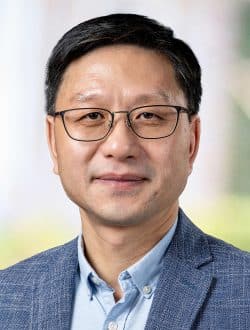Biography
Anding Zhu received the Ph.D. degree in electronic engineering from University College Dublin (UCD), Ireland, in 2004. He is currently a Full Professor in the School of Electrical and Electronic Engineering in UCD. His research interests are in the area of nonlinear modelling and characterisation of RF circuits and systems with a particular emphasis on digital linearisation of RF power amplifiers for wireless communications. He has published over 200 peer-reviewed papers and received research funding from various sources including awards from Science Foundation Ireland (SFI), European Space Agency (ESA), Enterprise Ireland (EI) and industry donations.
Prof. Zhu is an IEEE Fellow. He served as the Secretary of Administrative Committee (AdCom) of the IEEE Microwave Theory and Technology Society (MTT-S) in 2018 and has been an Elected Member of MTT-S AdCom since 2019. He currently chairs the Budget Committee and is President-Elect. He will serve as President of MTT-S in 2026. He also served as Chair of the MTT-S Microwave High-Power Techniques Committee (TC-12) from 2020 to 2021. He was General Chair of 2018 IEEE MTT-S International Microwave Workshop Series on 5G Hardware and System Technologies (IMWS-5G) and Guest Editor of IEEE Transactions on Microwave Theory and Techniques on 5G Hardware and System Technologies. Prof. Zhu was a recipient of 2021 IEEE MTT-S Microwave Prize and served as a Track Editor of IEEE Transactions on Microwave Theory and Techniques from 2020 to 2022. He is currently an Associate Editor of IEEE Microwave Magazine. Prof. Zhu was also a Member of the IEEE Future Directions Committee from 2020 to 2023.
Presentations
The Evolution of RF Power Amplifiers: From Past Advancements to Future Challenges
Radio frequency (RF) power amplifiers (PAs) are fundamental components in nearly all wireless transmitters, from tiny sensors and mobile phones to high-power base stations. Their primary function is to boost RF signals by converting DC power into amplified radio waves, ensuring reliable transmission over distances. However, this critical role comes with challenges: RF PAs often struggle with low efficiency in order to meet linearity requirements, particularly in high-power applications. In areas such as cellular infrastructure, where energy consumption is substantial, improving PA efficiency has become more urgent than ever, driven by rising energy costs and growing demand for greener and more sustainable solutions.
This talk will trace the evolution of RF PAs over the past decades, highlighting key technological advancements and shifts in design strategies. The focus will be on the ongoing challenges of achieving high efficiency while maintaining performance, particularly in cellular base stations. Additionally, the talk will explore how emerging AI-driven tools can help address these challenges, unlocking new possibilities for innovation in PA architectures and paving the way for the next generation of wireless communication systems.
Digital Predistortion for 5G/6G Wireless Transmitters
Digital predistortion (DPD) has been widely adopted to keep RF power amplifier operating with high efficiency without losing linearity in modern wireless systems. The use of DPD will continue in 5G systems and beyond, but the shift from single antenna to multiple-input multiple-output (MIMO) phased arrays and the ever-increasing signal bandwidth have presented significant challenges for DPD designers in managing power consumption and meeting linearity requirements. This presentation provides a comprehensive overview of the evolution of digital predistortion techniques for wireless transmitters, starting with the traditional Volterra series and progressing to modern machine learning approaches. The limitations of conventional techniques will be discussed, highlighting the need for new approaches. Recent advances will be presented, including new advanced model architectures, complexity reduction techniques and fast model adaptation algorithms. Examples of the practical application of these techniques will also be given.
